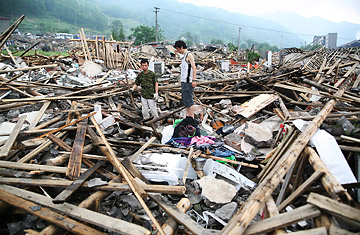
Earthquake survivors try to salvage what they can from their destroyed houses in the Ronghua Township of Shifang, China.
(4 of 4)
On the morning of 9/11, Rescorla heard an explosion and saw Tower 1 burning from his office window. A Port Authority official came over the P.A. system and urged people to stay at their desks. But Rescorla grabbed his bullhorn, walkie-talkie and cell phone and began systematically ordering Morgan Stanley employees to get out. They performed beautifully.
They already knew what to do, even the 250 visitors taking a stockbroker training class. They had already been shown the nearest stairway. "Knowing where to go was the most important thing. Because your brain — at least mine — just shut down. When that happens, you need to know what to do next," says Bill McMahon, a Morgan Stanley executive. "One thing you don't ever want to do is to have to think in a disaster."
On 9/11, some of the dead might well have survived if they had received Rescorla's warnings to always go down rather than up. But in the absence of other information, some people remembered that victims had been evacuated from the roof in 1993. So they used the last minutes of their lives to climb to the top of the towers — only to find the doors locked.
As Rescorla stood directing people down the stairwell on the 44th floor, the second plane hit — this time striking about 38 floors above his head. The building lunged violently, and some people were thrown to the floor. "Stop," Rescorla ordered through the bullhorn. "Be still. Be silent. Be calm." In response, "No one spoke or moved," Stewart writes. "It was as if Rescorla had cast a spell."
Rescorla had once led soldiers through the night in the Vietcong-controlled Central Highlands of Vietnam. He knew the brain responded poorly to fear — but he also knew it could be distracted. Back then, he had calmed his men by singing Cornish songs from his youth. Now, in the crowded stairwell, Rescorla sang into the bullhorn. "Men of Cornwall stand ye steady. It cannot be ever said ye for the battle were not ready. Stand and never yield!"
Between songs, Rescorla called his wife. "Stop crying," he said. "I have to get these people out safely. If something should happen to me, I want you to know I've never been happier. You made my life." Moments later, he had successfully evacuated the vast majority of Morgan Stanley employees. Then he turned around. He was last seen on the 10th floor, heading upward, shortly before the tower collapsed. His remains have never been found.
Rescorla taught Morgan Stanley employees to save themselves. It's a lesson that has become, somehow, rare and precious. When the tower collapsed, only 13 Morgan Stanley colleagues — including Rescorla and four of his security officers — were inside. The other 2,687 were safe.
To learn more about survival skills in a disaster, go to The Unthinkable.
Ripley, a senior writer at TIME, covers homeland security and risk. This article is adapted from The Unthinkable: Who Survives When Disaster Strikes — and Why. © 2008 by Amanda Ripley. To be published by Crown Publishers, a division of Random House Inc. On sale June 10, 2008.
